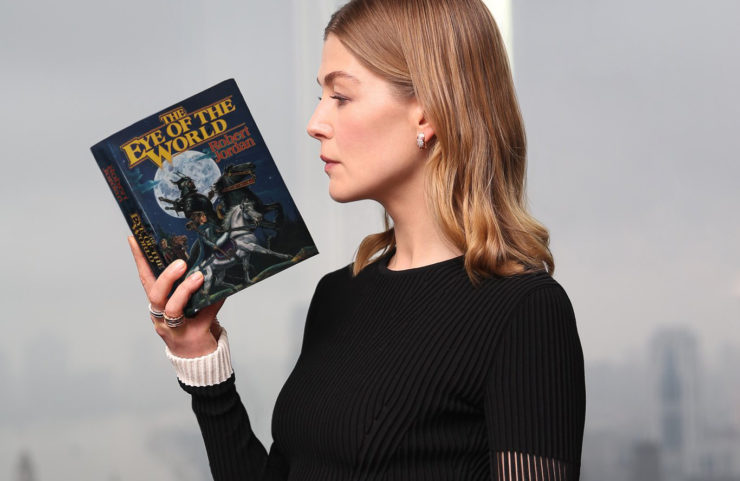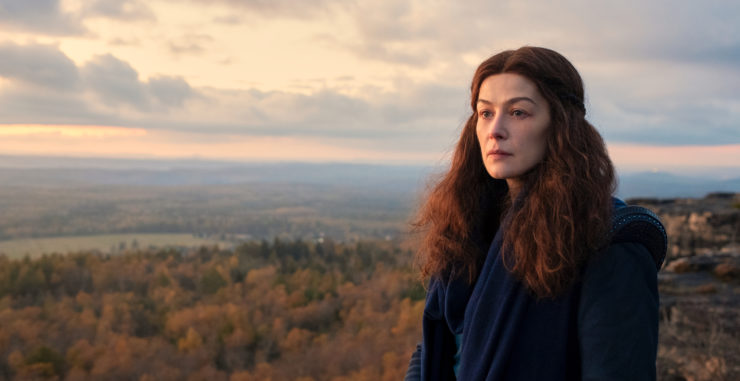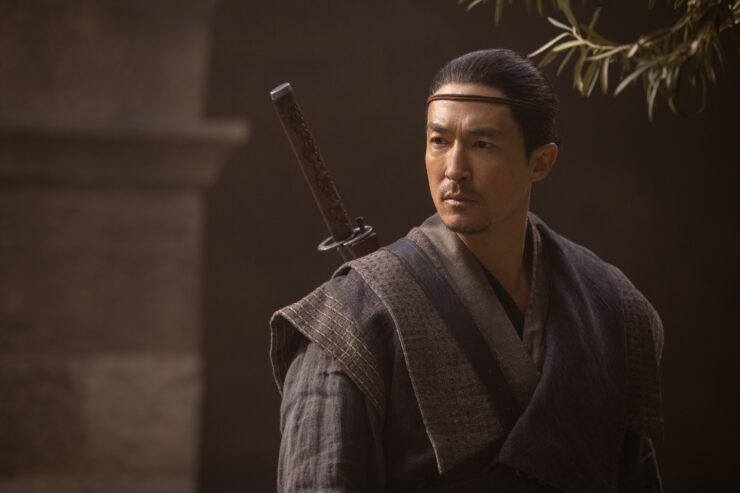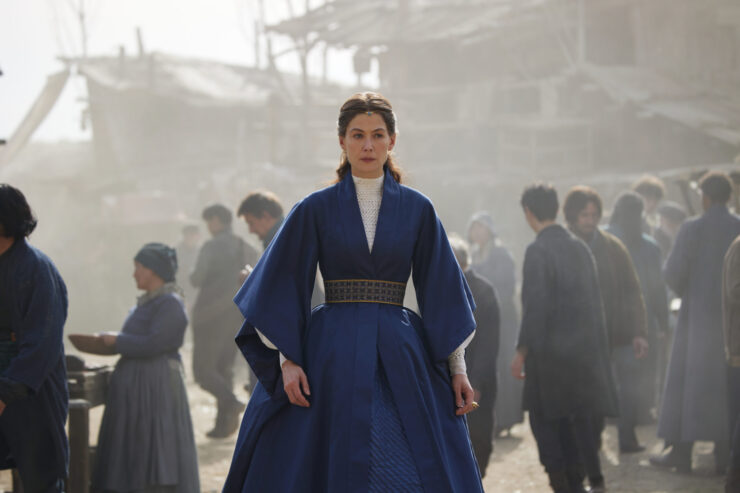This interview took place before the 2023 SAG-AFTRA strike. Without the labor of the writers and actors currently on strike, the series being covered here wouldn’t exist.
The second season of The Wheel of Time is set to premiere on Prime Video tomorrow. The first season gave us a lot of surprises, including having Moiraine (Rosamund Pike) cut off from the One Power, something that doesn’t happen in Robert Jordan’s books. But although Pike didn’t have Jordan’s words to look to when playing Moiraine in this state, she did point out that there is plenty in the source material about what someone felt like when they were stilled.
“This is about the most devastating thing that can happen to a woman,” she told me in an interview that took place before the SAG-AFTRA strike. “It’s this aching, primordial loss that is akin to the loss of a child, or it’s something where your whole life is not worth living anymore.”
Pike and I talked to me about how she portrays Moiraine differently on the show than when she records the audiobooks for the series, what scene from Jordan’s The Dragon Reborn she’d love to play on-screen, and some non-spoiler talk on what happens with her character in the first few episodes of season two.
Read on for our full discussion.

This interview has been lightly edited for clarity and brevity.
To kick us off, I know you’re familiar with the books obviously, having done the audiobook versions of the first three already. Is there any specific character you’d love to see Moiraine go against or any place within The Wheel of Time world that you would love to visit as Moiraine that you just haven’t had a chance to yet?
I’m very interested in all of the storyline of book three with Moiraine and Perrin. I think it’s very beautiful, I love the place where she and Perrin are staying at an inn and Perrin is introduced by the innkeeper to his brother, Noam, who is also a wolf brother but a man who’s been absolutely driven mad by his connection with the wolves and he has become more wolf than man. And Perrin sees him and is truly terrified and comes to Moiraine in the night, because Moiraine is asked to heal this character and she tries and she immediately sees that healing won’t work because there’s no man left. It’s all wolf. And I think Perrin has this terrifying realization that this could happen to him.
Now that’s something from the books, which I’ve done through the audiobook and played and thought, “Well, that’s an amazing moment.” And as we know from the way that [showrunner Rafe Judkins] and his team adapt these books, the storylines we love will come into the show, but they might not come in in the way that we think they’re going to come in. So if that storyline comes in, it could be that I’m not part of it. I can’t be wedded to anything to particularly but that’s just a truthful answer to your question.
That makes me think of something else: You play Moiraine, obviously, on the TV show but you’ve also voice-acted her with the books. Is there anything you did when you were doing the audiobooks that informed your performance onscreen or vice versa?
I think it’s always good to read how Moiraine is described. She’s described sometimes as more ice than woman, or like a block of ice, or the way she glides. So often I remind myself to just try and flow more as Moiraine, and try and glide where possible. [Laughs] It’s not always possible to glide, sometimes it’s like, “Rosamund, hey—you got to move on, please, we need some pace in this section.” But you just have it as your touchstone every so often, is the way she’s described.
And I think Moiraine’s voice is often described as like bells or, it’s musical or it has the sort of tingling that sends shivers down your spine. Now I can do all of that with Moiraine in the books, because of the way she speaks, almost in this cryptic, slightly mellifluous fashion. The Moiraine that we have in the series is more direct—we need her to move the story on and she speaks less in the sort of cryptic fantasy speak, I suppose, that [author Robert Jordan] does so brilliantly. So there is a difference in my Moiraine in the books.

One thing that didn’t happen the books is that Moiraine gets cut off from the One Power. When you were preparing for that at the end of Season One, and obviously as it carries over into Season Two—without getting spoilery, can you talk about how you prepared for portraying Moiraine was going through that experience, especially because there wasn’t source material explicitly laying that out?
No, there isn’t, but there is enough discussion about what stilling means for an Aes Sedai in the books, the idea that this is about the most devastating thing that can happen to a woman. It’s this aching, primordial loss that is akin to the loss of a child, or it’s something where your whole life is not worth living anymore. It’s a grief so extreme that many women will take their own life within a year.
Those are the pieces of information I had, and I think my own imagination would have led me to a similar place because of the way the One Power is described. You can imagine its opposite. The One Power is something so sweet running through your veins that you can’t draw enough of it, and you can’t bear to let it go when you have to let it go. And I think it’s part of Moiraine’s identity and we know with anything, whether it’s the loss of a partner, the loss of a career, the loss of an ability, if something is connected with your identity, then the loss of it is extreme and profound. And that’s what we meet Moiraine contending with at the top of season two. So we see her more human, more vulnerable than we’ve ever seen. And vulnerability is not a place where Moiraine is happy living. She feels incredibly exposed. And when she feels exposed, she attacks, she lashes out at those closest to her. And those closest to her in this case is one person—it’s Lan, and she’s very cruel. And we don’t understand it. We don’t want it, you know, but it’s what we get because that is who she is. She’s a proud woman through and through, and if she feels ashamed, she pushes away the people who might see that shame.

Well, thank you so much. I appreciate it. That’s my time, though I could talk to you forever.
Oh, but I’m just getting started! I was just about to tell you—let me just tell you that we see underneath that, that Moiraine is a fighter, and so we see her resilience. And the exhilarating thing about season two is that we see this humanity, which is no longer protected by the One Power, that has to drive her forward with her smarts, her intelligence, her wit, her ability to manipulate events and see ahead just through guile and imagination. So she’s like a chess player who’s 16 steps ahead of her opponents and her allies. And we start in season two to see the breadth of Moiraine’s reach. That is something completely separate from her use of the One Power, and that’s where the fun lies for me in season two.
The first three episodes of The Wheel of Time’s second season start streaming on Prime Video on September 1, 2023. Subsequent episodes will become available on a weekly basis.











I’d like a story on the following six months of Umma’s life. She comes back to a very changed domestic world.
Her daughter and her lover are dead. Her slave, the most valuable thing she owned, is no longer hers, and is suddenly expecting pay and time off. Her family thinks she’s gone daft. Her relationship with her neighbors is changed. She’s got an unexplained bag of gold, and doesn’t know why. When people say “tell us about how you met the Emperor” she won’t know what they’re talking about. Her little restaurant is suddenly selling beer.
This book is a domestic story, but it treats the domestic changes that happen as unimportant.
Urgh. I know what you mean about the protagonist. As soon as she expressed shock – shock! – that Rome had slaves, I had to put the book down. (Even if she’s never picked up a history book, surely she’s at least heard of Ben Hur or Spartacus?)
My tolerance for idiot heroes is low.
But what happens to Nicole’s children? Isn’t she worried about them? Is she glad to get back to them? Did they even notice she was gone?
This is the kind of book I would normally like a lot, except for the part where I’d throw it across the room in about thirty pages flat.
Nicole doesn’t annoy me anywhere near as much as she does Jo Walton. Mostly, I think, because I’m a LA lawyer and deal with Nicoles pretty much every day. Even in the highly-educated people I deal with, there’s a pitiable lack of knowledge of history and even less interest. Household Gods remains a favorite for the very reason that Nicole is just a normal, unexceptional person. There are plenty of other books where the time traveler is able to MacGyver his or her way into bringing our tech back to the historical period, but most people I know couldn’t do that. I think the instantly adaptable people we always see in these books are the exception.
TexAnne: Spoiler! Their divorced father has to come back from holiday to look after them — in the real world she’s only in a coma for a week. She misses them a little, but surprisingly little, and she hardly worries about them at all, to her mind they’re safe in the future. In fact she survives because her four year old calls 911. They’re better children than she deserves.
Ursula: Yes, so would I. It was hoping I might get that, or a little of it, at the end of the book, that kept me reading the first time. Umma in LA would also have been nifty.
MichaelK: I don’t think the protagonist of this sort of novel needs to be supercompetent, but are the people you know really unaware that Rome had slaves? I think Nicole is worse than a normal unexceptional and well over into the self-centered and blinkered end of things.
Too bad. I’d have liked to read the Roman scenes, but the protag would totally put me off. If I wanted self centered and ignorant, I could talk to my SiL. ;)
I admit, I was one of the ‘couldn’t finish this’ readers, and had pretty much put it out of my mind. Your description reminds me of one of the Jane Austenish books (Confessions of a JA Addict?), where the protagonist, despite her supposed love of JA books, spends her time in the past either whining about the chamber pots or refusing to believe that she’s really there. Sigh. So what if you are in a coma and dreaming the whole thing? Enjoy the ride, damnit!
Pam Adams @@@@@ 7: Off topic, but you reminded me of the British miniseries Lost In Austen, which I really rather like because she doesn’t spend all her time whinging. She’s stuck in 1811 and she doesn’t necessarily adapt, but she’s willing to stick with it and see where it goes. She’s very aware that she’s in the past and that she could screw with the future (but that doesn’t stop her from sharing her lip gloss). She adopts their customs but only to a point (she sneaks out for smokes, snogs someone she shouldn’t, and kicks an arsehole in front of an entire ballroom). She not only understands the time period from Austen’s work but from paying attention in school. I highly recommend the British cut; the American version on is massively edited down (from 3+ hrs to 1.5).
A pretty random question, but isn’t “Umma” a name of semitic origin? If so, does that play in the story?
Linguistically ignorant: It doesn’t seem to be of semitic origin in the story. However, Jews are mentioned (once) in a relatively positive way, whereas Christians are thought of as being fanatical weirdos.